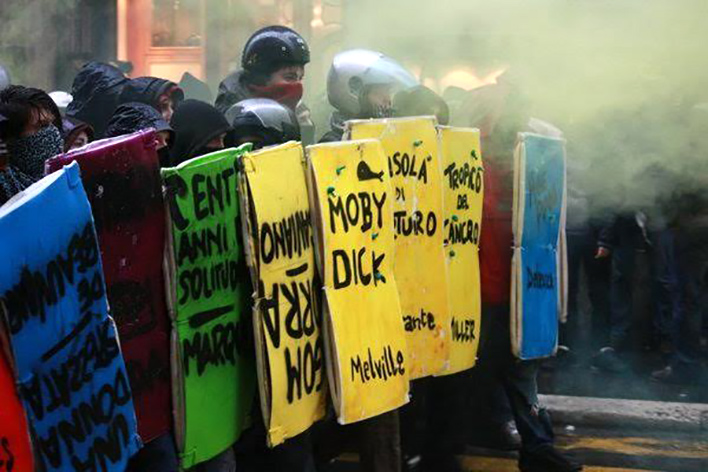“Del passato non si parla”: rimozioni e buchi neri nella narrativa di Laurent Mauvignier
Abstract
La storia del Novecento ha obbligato gli scrittori a confrontarsi a più riprese con le potenzialità e le mancanze del mezzo letterario di fronte all’indicibile. Laurent Mauvignier ha fatto di questo confronto il perno della propria poetica: dalle piccole tragedie private ai grandi drammi della storia recente, passando attraverso la mistificazione mediatica di assurdi faits divers, i suoi romanzi affrontano costantemente il problema del Male e della sua rappresentazione.
Con Des hommes (2009) Mauvignier ha rivolto questa istanza a uno dei principali rimossi della memoria francese: la guerra d’Algeria. Attraverso un romanzo “polifonico”, egli affronta una vicenda che ha nel silenzio un proprio attributo (il silenzio dei reduci studiato da Benjamin Stora e Andrea Brazzoduro) e che per questo ha potuto essere manipolata dal discorso istituzionale e mediatico. La narrazione mostra infatti come la remissione delle colpe collettive si fondi su un’“ingiunzione a tacere” motivata innanzitutto dal peso sociale di un racconto che nessuno vuole.
Questo intervento si propone di studiare come il romanzo di Mauvignier, rifacendosi al nouveau roman di Duras e Simon, ricorra allo sperimentalismo formale per «défamiliariser» l’evento storico attraverso gli strumenti di una fiction che rivendica l’esperienza secondaria per riscattare un racconto rifiutato dal discorso collettivo.
Downloads
Riferimenti bibliografici
Brazzoduro, Andrea, Soldati senza causa. Memorie della guerra d’Algeria, Roma-Bari, Laterza, 2012.
Capone, Carine, “A qui parler des silences? Une étude de Des hommes, de Laurent Mauvignier”, Revue critique de fixxion française contemporaine, 2 (2011): 39-51.
Chaumont, Jean-Michel, La concurrence des victimes: génocide, identité, reconnaissance, Paris, La Découverte, 2002.
Cohen, Stanley, States of denial: knowing about atrocities and suffering, Cambridge, Polity, 2001; trad. it. Stati di negazione: la rimozione del dolore nella società contemporanea, Roma, Carocci, 2002.
Crocq, Louis, Les traumatismes psychiques de guerre, Paris, Odile Jacob, 1999.
Faerber, Johan, “L’exception démocratique de l’écriture”, L’exception et la France contemporaine. Histoire, Modernité, Littérature, Eds. Marc Dambre - Richard J. Golsan, Paris, Presses Sorbonne Nouvelle, 2010: 265-274.
Giglioli, Daniele, “Il buco e l’evento. Sul Taccuino siriano di Jonathan Littell”, Mosaico francese. Studi in onore di Alberto Castoldi, ed. Juanita Schiavini Trezzi, Bergamo, Moretti e Vitali, 2012: 279-291.
Giglioli, Daniele, Critica della vittima. Un esperimento con l’etica, Roma, Nottetempo, 2014.
Fleury-Vilatte, Béatrice, La mémoire télévisuelle de la guerre d’Algérie, 1962-1992, Paris, Stock, 2000.
Gaje - Fnaca, Ils avaient vingt ans dans le Djebel 1952-1962, Mâcon, Fnaca, 1989.
Mauss-Copeaux, Claire, Appelés en Algérie. La parole confisquée, Paris, Hachette, 1998.
Mazzarella, Arturo, Il male necessario. Etica ed estetica sulla scena contemporanea, Torino, Bollati Boringhieri, 2014.
Mauvignier, Laurent, Loin d’eux, Paris, Minuit, 1999; trad. it. Lontano da loro, Rovereto, Zandonai, 2008.
Mauvignier, Laurent, Apprendre à finir, Paris, Minuit, 2000; trad. it. La camera bianca, Rovereto, Zandonai, 2008.
Mauvignier, Laurent, Ceux d’à côté, Paris, Minuit, 2002; trad. it. I passanti, Roma, Delvecchio, 2014.
Mauvignier, Laurent, Dans la foule, Paris, Minuit, 2006.
Mauvignier, Laurent, Des hommes, Paris, Minuit, 2009; trad. it. Degli uomini, Milano, Feltrinelli, 2010.
Mauvignier, Laurent, Ce que j’appelle oubli, Paris, Minuit, 2011; trad. it. Storia di un oblio, Milano, Feltrinelli, 2012.
Mauvignier, Laurent, Revue Décapage, 43 (2011): 99.
Milkovitch-Rioux, Catherine, Mémoire vive d’Algérie. Littératures de la guerre d’indépendance, Paris, Buchet Chastel, 2012.
Prost, Antoine, Les anciens combattants et la société française 1914-1939, vol. I, Histoire, Paris, Pfnsp, 1977
Raccis, Giacomo, “Oltre il muro del reale. Intervista a Laurent Mauvignier”, Le Parole e Le Cose, 25/11/ 2014, http://www.leparoleelecose.it/?p=16859 (ultimo accesso 28/04/2015).
Ricoeur, Paul, Temps et récit, vol. I, Paris, Seuil, 1983; trad. it. Tempo e racconto, vol. I, Milano, Jaca Book, 1983.
Ricoeur, Paul La Mémoire, l’histoire, l’oubli, Paris, Seuil, 2000 ; trad. it. La memoria, la storia, l’oblio, Milano, Raffaello Cortina, 2003.
Rotman, Patrick - Tavernier, Bertrand, La guerre sans nom. Les appelés d'Algérie: 1954-1962, Paris, Seuil, 1992.
Rousso, Henry, Le Syndrome de Vichy. De 1944 à nos jours, Paris, Seuil, 1990.
Schyns, Désirée, La mémoire littéraire de la guerre d’Algérie dans la fiction algérienne francophone, Paris, L’Harmattan, 2012.
Stora, Benjamin, La gangrène et l’oubli. La mémoire de la guerre d’Algérie, Paris, La Découverte, 1991.
Stora, Benjamin, Le dictionnaire des livres de la guerre d'Algérie. Romans, nouvelles, poésie, photos, histoire, essais, récits historiques, témoignages, biographies, mémoires, autobiographies: 1955-1995, Paris-Montréal, L’Harmattan, 1996.
Talbott, John, The War without a Name: France in Algeria 1954-1962, New York, A. Knoff, 1980.
Viart, Dominique, “Le silence des pères”, Études françaises, figures de l’héritier dans le roman contemporain, 45, 3 (2009): 95-112.
Vidal-Naquet, Pierre, “Une fidélité têtue. La résistance française à la guerre d’Algérie”, Vingtième siècle, III, 10 (1986): 3-18.
Wieviorka, Annette, L’ère du témoin, Paris, Plon, 1998; trad. it. L’era del testimone, Milano, Raffaello Cortina, 1999.
Informazioni sul copyright
Questa licenza permette a terzi di riprodurre, distribuire, comunicare al pubblico, esporre in pubblico, rappresentare, eseguire, recitare e modificare quest'opera, purché vengano citati l'autore e la rivista. Questa è la più ampia tra le licenze Creative Commons, rispetto alle libertà concesse a terzi sulle opere licenziate sotto Attribuzione.









